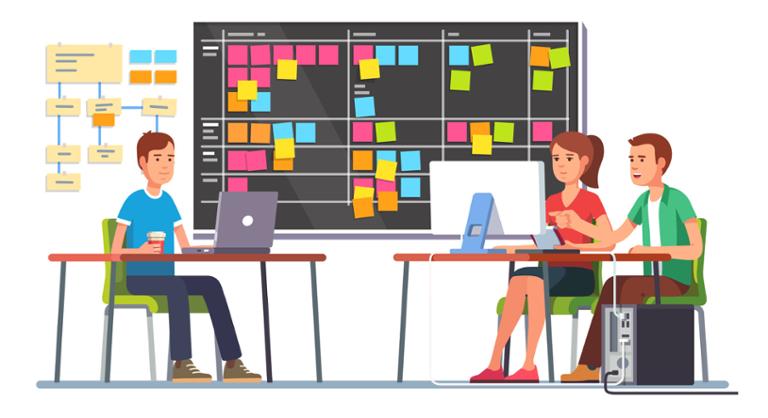Interested in a DevOps career? DevOps has grown into one of the highest-paying jobs in the industry, and companies are hungry for high performing talent who can enact practices that drive continuous delivery, high product quality, and streamline the development lifecycle (all critical components of DevOps methodology).
As you begin learning more about DevOps and its development processes, it’s important to know which résumé terms are currently popular for the profession, as well as current industry trends and how much you can earn (it hinges heavily on skills and industry, as you might expect).
But no two career paths are exactly alike, and it’s also key to know how other technologists have found their way into a DevOps career. Here are three stories that show the complete DevOps arc:
Beginner DevOps
Two years ago, junior-level DevOps engineer Josh Nelson was working in IT. He started talking to developers and development teams who were building ETL tools for their source of truth (which was NetSuite at the time) into a data warehouse. This involved doing manual imports on a daily basis.
“It took a lot of time and we thought, there has to be a more efficient ways to do this,” Nelson said. “That got me into the DevOps area and learning about UTM tools and automation.” This led to him learning about Docker and containers and auto deployment, so people didn’t have to be involved all the time and wouldn’t have to take down a whole website for a day just to do an update.
While in IT, Nelson wanted to get into DevOps, so he tried to develop the same mentality as a DevOps engineer. He spent a few years in self-study, learning AWS and Google Cloud, finding ways to automate things, setting up home lab servers, and learning how to do as much as he could on his own.
Nelson got another job working in IT at a company that had a fairly new DevOps setup, and eventually got a job in that department. He’s only been in that position for a few months, and feels he still has a lot to learn. For that, he seeks out help from others, and spends some time on the DevOps subreddit.
“We’re all still trying to learn what DevOps really is, but most people who are in DevOps are also willing to help others learn,” he said. “They’ll go the extra mile to sit down with you and that’s been really helpful to me.”
Even seasoned DevOps engineers need to keep learning. “There's always new products coming out that are better, and new versions that change things. Your ability to be adaptive and learn is really helpful,” Nelson explained.
His advice is to be open to failing and learning from those failures: “Being open to failure and reaching out for help will make you go far.”
Mid-Tier DevOps
Lindsay Young, a mid-career DevOps engineer, has a bachelor’s degree in history.
She learned how to communicate and teach different concepts as a substitute teacher before going back to school herself, this time for a master’s degree in public policy. Next, she worked in communications and data reporting at a nonprofit. The desire to pull data for her stories is what led her to programming.
“I had a colleague that offered a once-a-week Python class,” Young said. She took the class and had some really successful projects in the campaign finance space, showcasing the return on investment of PACs. She also did a bit of web design. In one of her projects, she normalized data for FARA records, making it easier to explore.
Young began working with APIs and maintaining products, which led to her learning about DevOps out of necessity. “It was a very liberating to be able to do some of those things for myself using Heroku, at the time,” and to make sure things were built correctly and worked consistently, she said.
Young developed her skills through trial by fire. In one position, she said, people would choose what they wanted to work on—the seasoned developers opt for the projects they cared about, leaving a lot of projects behind.
“If no one else wanted to do something, no matter how important that was, I’d think, ‘Well that can't just die. I’ll pick that up,’” Young said. This gave her a lot of responsibility as a new developer. “It’s very physically and emotionally draining, but there are times where I just had to learn things really quickly because I thought things would fail if I didn’t, and so I did,” she said. Although she doesn’t necessarily recommend the strategy, “learning by terror is really effective.”
She often finds herself picking up projects that still need to run as people leave, and says that working on projects that aren’t necessarily high-profile, but help things run more smoothly in the long term, is crucial.
Actually doing something is so much more important than any particular education or certification, suggests Lindsay Young, a mid-career DevOps engineer: “These programs can be helpful as long as they’re hands-on, because DevOps is about automating different types of manual tasks and problems that you have.” It’s about learning how to apply engineering as a problem-solving tool, and about making things work in a way that’s more consistent and takes less time to maintain, rather than just completing a series of steps.
Although it’s less of an issue as she becomes more senior, Young watches out for office hierarchies where people are dismissive of coworkers who aren’t seen as technical. “I’ve seen that be pretty toxic for people. That’s something I always watch out for, so that people who make the project run in so many ways, I want to make sure they’re valued,” she said.
She keeps an eye towards culture and looks for teams that work well together. Although you can make things better or worse, “there’s a floor or a ceiling depending on the people that you’re working with, so it’s really important to find a team where people are going to respect you,” she said.
Top-Tier DevOps
Wes Novack, a systems architect at the technology skills platform Pluralsight, got an associate’s degree in Computer Information Systems. That, combined with a summer spent volunteering at a local elementary school, helped him kick off his career. At the school, he helped with client computer maintenance, which earned him a recommendation letter. At the time, he was working at an MCI call center doing telemarketing, and he applied for an internal company program where he could work with the tech team at the call center while getting paid as a telemarketer.
From there, Novack took another full-time position doing IT operations in a different call center. “That’s where I learned troubleshooting, working with Windows clients, and a lot of different telemarketing-related call center technology types of skills,” he said.
Next, Novack began working with a web hosting group at MCI with a team that built, managed and ran a platform as a service for hosting web applications. “It was essentially an opportunity to start working with a technology team within the company that was much, much broader focused, and had a much, much higher impact on the company,” he said.
Verizon acquired MCI and the call centers were shut down, but he wasn’t affected by the layoffs because he was working in the national group.
During his eight years at the national web hosting group, Novack says he gained deep knowledge of web application development and systems and working with development teams towards a common goal. “That is essentially the ethos of DevOps: getting these infrastructure folks tightly aligned and working together with the development folks,” he said.
It was during this time that Novack completed his bachelor’s degree in information technology from Western Governors University. Although he says you can’t go wrong with a computer science degree, he also points to the importance of expanding skill sets, even if that means going beyond day-to-day responsibilities.
While sometimes it takes switching roles and moving to a new company, hands-on learning for side projects and experiments will often get you where you need to go.
“If you're entirely focused on the particular tasks that are assigned to your job, and that job isn't a very extensive role that has impact and huge responsibility, then you need to really take initiative and learn more things on your own and work on things that are not maybe directly applicable to your current role,” he said.
That could include learning about a specific area for a future role you want and doing a side project that can help you build expertise. Future employers are looking for hands-on experience, and while that experience in a professional setting might be preferred, learning it on your own can also be useful for employers to see.
Novack says that progressing in your career area means that you are likely to end up maintaining neglected pieces of technology and mitigating risks stemming from them, something that gets easier over time as you develop common ways of approaching or solving problems that can be useful in other situations.
That said, Novack quoted his own employer, stating that 50 percent of what you know will be irrelevant in two years due to the vast rate of change that occurs in the technology field. “There are so many new things being developed and created and put out as far as products, frameworks, languages, tools and processes,” he said. “There's just new innovation constantly in this field. So if you get stuck in a rut where you're not learning something new and innovating on your processes or your ways of doing things to make things better, then you're going to get left behind… This field is really one of constant learning.”
Novack recommends looking for new positions if you feel like you’re no longer learning on the job. When his previous role became a bit stagnant, he got a job at Pluralsight, where he ramped up his knowledge of software development and processes and Agile ways of working, in DevOps and automation and cloud.
“Pluralsight has a technology skills platform constantly publishing new courses on areas of software development, and IT operations and data and security. It’s a great platform to learn new things and keep up with the pace of change,” he said.
Novack has also noticed that engineers, architects or team leaders step into advisor roles as they become more senior. “You become an advisor and a person that helps others learn, mentoring others and training other folks, onboarding new employees. Teaching them systems and tools becomes much more a part of your responsibilities as a senior person,” he said.



